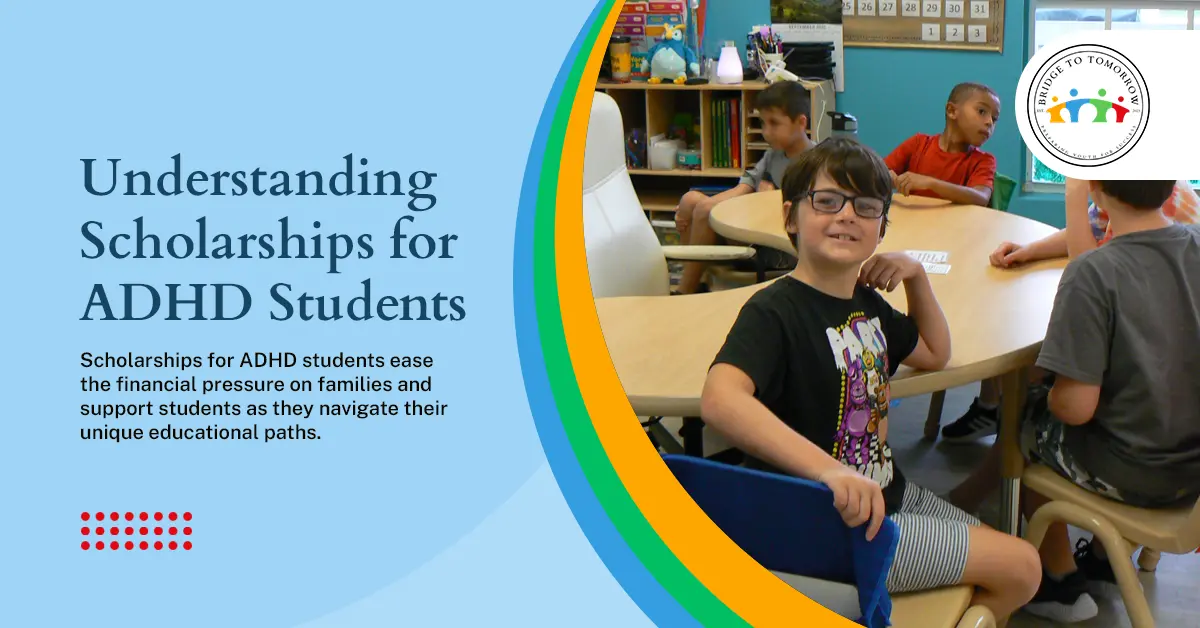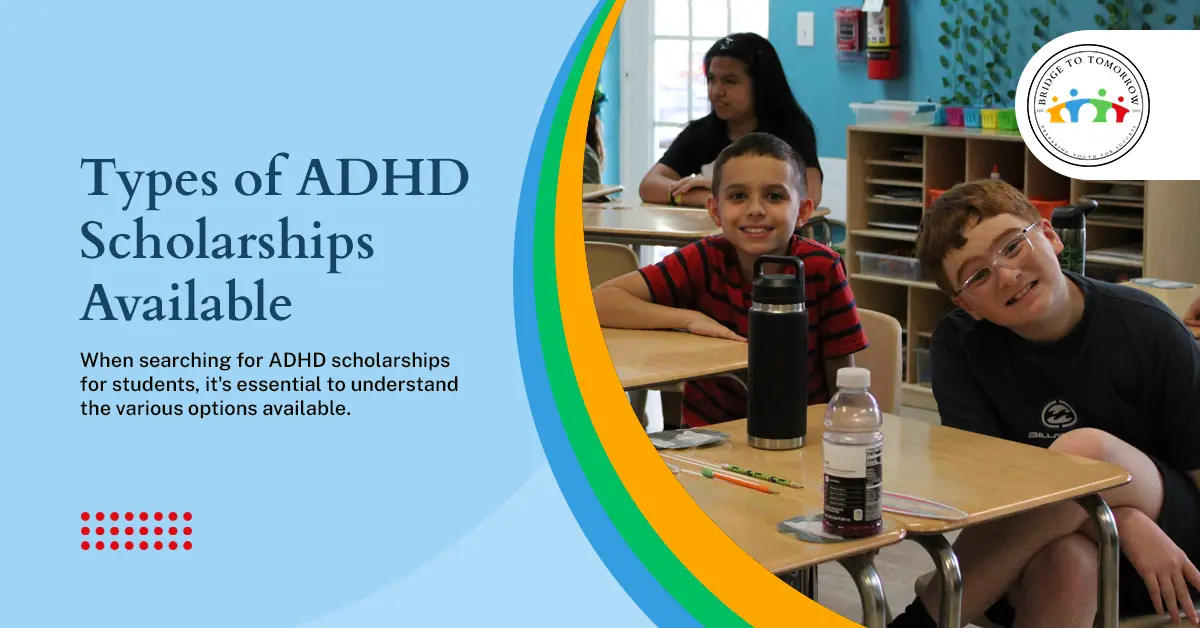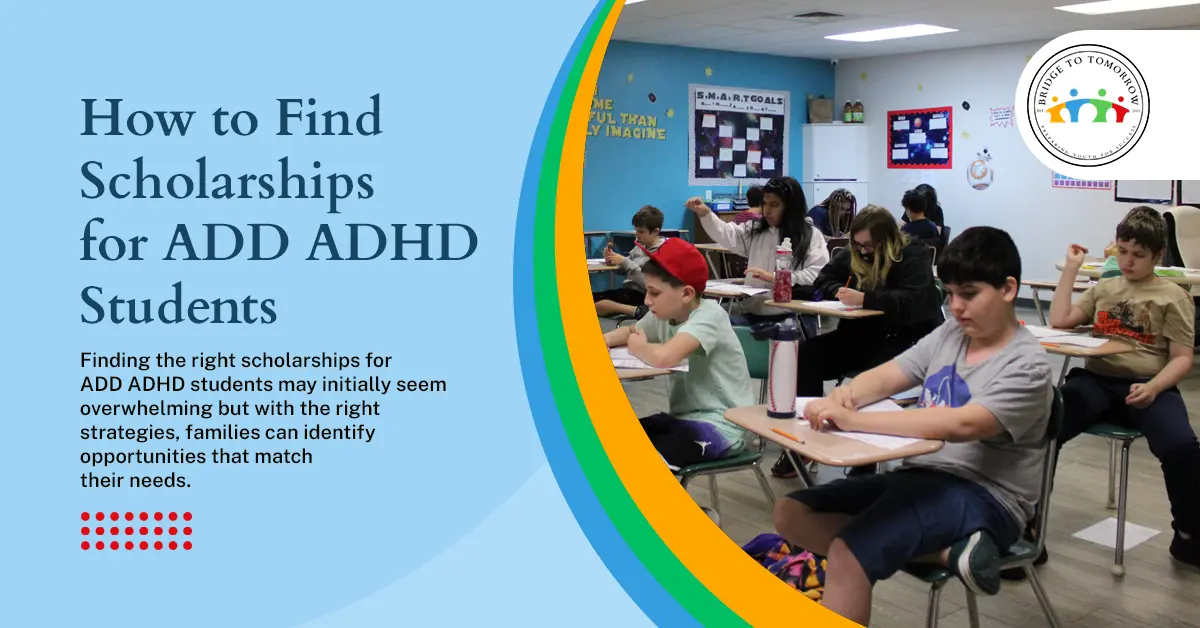Scholarships for ADHD students offer a unique opportunity for neurodivergent learners to access quality education tailored to their needs. For families navigating the challenges of ADHD, finding financial support can feel overwhelming.
This guide simplifies the process by highlighting various scholarships available for ADHD students and providing tips on how to apply. Understanding the options and eligibility criteria empowers families to make informed decisions, fostering an environment where students with ADHD can thrive academically and personally despite obstacles.

Scholarships for ADHD students ease the financial pressure on families and support students as they navigate their unique educational paths. These scholarships go beyond traditional funding by considering the challenges associated with ADHD and offering resources to enhance academic success and personal growth. Understanding why these scholarships exist, who qualifies, and their benefits can help families make informed decisions.
ADHD can affect a student’s academic journey, leading to difficulties in concentration, organization, and time management. Scholarships specifically tailored for ADHD students recognize these obstacles and aim to provide support through financial aid and additional resources. Here are some common benefits provided by ADHD-specific scholarships:
These scholarships enable students to focus on their strengths and overcome potential barriers, paving the way for a more fulfilling educational experience.
Scholarships for ADHD students usually require applicants to prove their diagnosis and meet specific eligibility criteria. While every scholarship varies, most consider the following factors:
After verifying eligibility, reviewing each scholarship’s unique requirements is crucial to ensuring a strong application highlighting the student’s qualifications and potential.
Beyond financial assistance, ADHD scholarships provide students with recognition and encouragement. Many scholarships also offer extra benefits such as:
These benefits can help students thrive by providing guidance and support, boosting their confidence, and enhancing their academic journey.
To maximize these opportunities, students should consider exploring scholarships that align with their interests and career goals. Additionally, networking with ADHD advocacy groups and educational organizations can provide further guidance on how to find and apply for suitable scholarships. This proactive approach will ensure students can leverage every available resource to achieve their educational and career aspirations.

When searching for ADHD scholarships for students, it’s essential to understand the various options available. These scholarships can be categorized into several main types, each with its focus and criteria. Knowing these distinctions can help families find the best fit for their child’s educational goals and needs.
Merit-based scholarships are provided to students based on their academic achievements, leadership skills, or talents in arts or athletics. Despite the challenges of ADHD, many students excel in their studies or extracurricular activities and can qualify for these scholarships. Examples include:
These scholarships locate and reward students for their dedication and hard work, encouraging them to pursue their passions and academic excellence.
Need-based scholarships assist students with financial needs. These scholarships focus on providing opportunities for students who might not otherwise be able to afford higher education. Common requirements include:
Such scholarships can make a significant difference by covering tuition, books, and living expenses, reducing families’ financial stress.
Disability-specific scholarships cater directly to students with learning or developmental disabilities, including ADHD. These scholarships aim to support students who have overcome significant challenges in their academic journey. They often require:
Programs like these celebrate resilience and determination, offering targeted support to help students reach their educational potential.
Many colleges and universities offer scholarships tailored to students with ADHD or other learning disabilities. These scholarships may be included in a larger financial aid package or through the school’s disability services office. Examples include:
Understanding these options allows families to choose institutions prioritizing inclusivity and student support, ensuring a successful college experience.

Finding the right scholarships for ADD ADHD students may initially seem overwhelming but with the right strategies, families can identify opportunities that match their needs. The key is exploring multiple sources, using specialized search tools, and networking with organizations supporting ADHD and neurodiverse communities.
Online scholarship search engines and databases can simplify the process by allowing students to filter options based on eligibility criteria. Start with these platforms:
These resources allow families to narrow their search and focus on scholarships tailored to their circumstances.
Many ADHD support groups and non-profit organizations maintain scholarship lists for neurodivergent students. These organizations often have information on scholarships that are not widely advertised. Consider reaching out to:
Connecting with these groups can also offer students access to mentorship, workshops, and other support services.
School counselors are valuable resources for finding local or regional ADHD scholarships. Disability services offices at colleges and universities can also provide information on specific scholarships available to neurodiverse students.
By leveraging these resources, families can find scholarships that might otherwise go unnoticed, ensuring that students can access the support they need for academic success.
Applying for scholarships for ADHD students requires careful preparation to make your application stand out. By highlighting your strengths and addressing the challenges of ADHD, you can create a compelling narrative that resonates with scholarship committees. Below are some tips to enhance your chances of success:
A personal statement is your opportunity to share your story, achievements, and aspirations. Focus on how ADHD has shaped your journey and emphasize your resilience and determination. To make your statement impactful:
A well-crafted personal statement can leave a lasting impression and demonstrate your commitment to your education.
Letters of recommendation give an outside perspective on your abilities and character. Choose individuals who have seen your growth and achievements firsthand. Consider these potential recommenders:
Give your recommenders enough time and information about the scholarship to craft a personalized letter.
Most ADHD scholarships require documentation, such as proof of your diagnosis or academic records. Present these documents in an organized manner to make the review process easier for the committee:
Following these tips can streamline your application process and show the committee that you are a thorough and detail-oriented applicant. Taking the time to prepare your application thoughtfully improves your chances and showcases your commitment and enthusiasm for pursuing higher education.
Finding the right scholarships for ADHD students can open doors to a brighter academic future. With careful research, tailored applications, and perseverance, students can turn these opportunities into stepping stones toward achieving their dreams. By understanding the types of scholarships available and following proven strategies for applying, families can secure the financial support needed to make higher education accessible and rewarding.
Ready to take the next step? Reach out to Bridge to Tomorrow or call (321) 345-4232 for more information on how we can help you navigate scholarship opportunities.